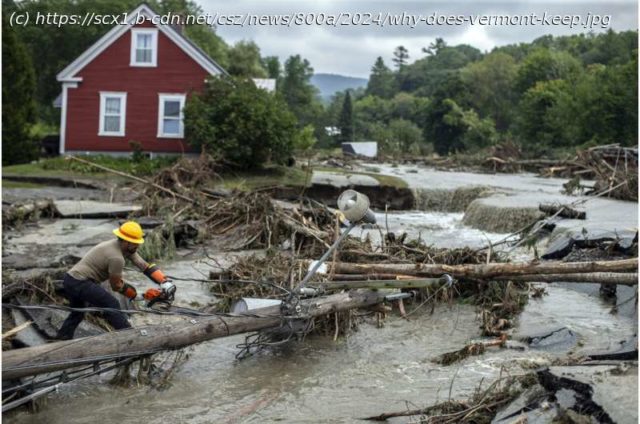Vermont is flooding. Not just yesterday, two weeks ago and a year before that, but experts say the state could see catastrophic events like these for the foreseeable future.
Vermont is flooding. Not just yesterday, two weeks ago and a year before that, but experts say the state could see catastrophic events like these for the foreseeable future.
Climate change is fueling stronger, more persistent storms and the state’s infrastructure lags along the Green Mountains’ riverside villages with steep faces and rolling hills that carry a huge amount of water.
Now, these towns are the epicenter of a flooding conundrum that state and federal officials are scrambling to resolve.
In the meantime, many homeowners are still trying to rebuild from floods just over a year ago—considered historic at the time, now becoming the norm.
A combination of factors leaves Vermont susceptible to these kinds of devastating floods. Here’s a look at a few, along with photos and video from the latest storms.
Extreme flooding conditions like these are often the result of random, short-term natural weather patterns heightened by long-term, human-caused climate change.
With climate change, storms are forming in a warmer atmosphere, making extreme rainfall a more frequent reality. The additional warming that scientists predict is coming will only make it worse, with the Northeast U.S. among the regions vulnerable to heavier rains in the future.
A warmer atmosphere holds more moisture, which results in storms dumping more precipitation that can have deadly or destructive results. For every 1 degree Celsius (1.8 degrees Fahrenheit) that the atmosphere warms, it holds approximately 7% more moisture.
A study last year in the journal Climate Change found that extreme precipitation in the Northeast will increase 52% by the end of the century. One of the study’s authors, Jonathan Winter, an associate professor of geography at Dartmouth College, also took part in research that found there had been a 50% increase in extreme precipitation events from 1996 to 2014.
Домой
United States
USA — IT Why does Vermont keep flooding? It's complicated, but experts warn it could...






